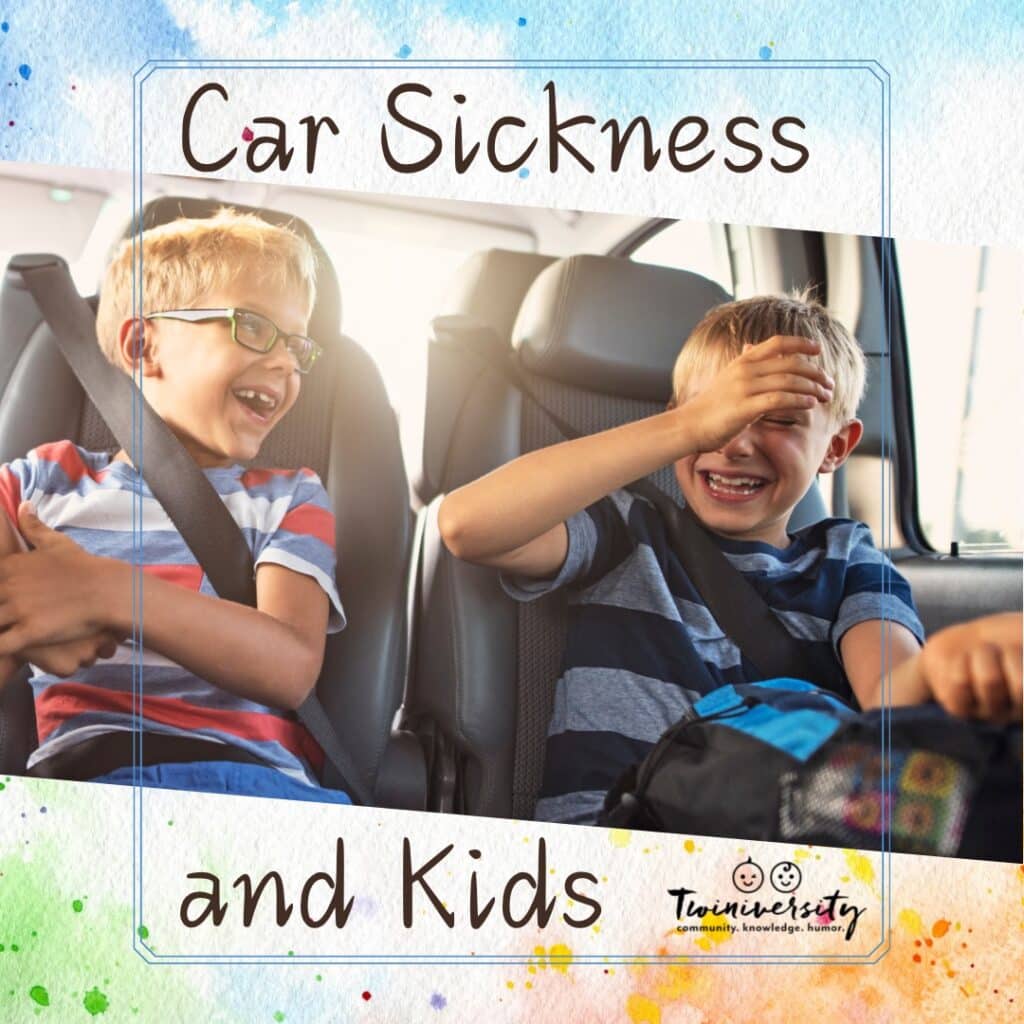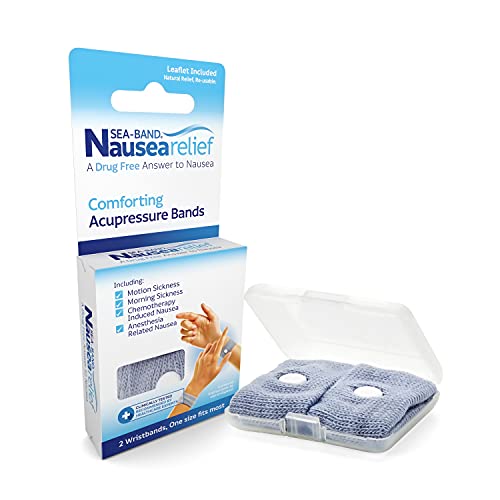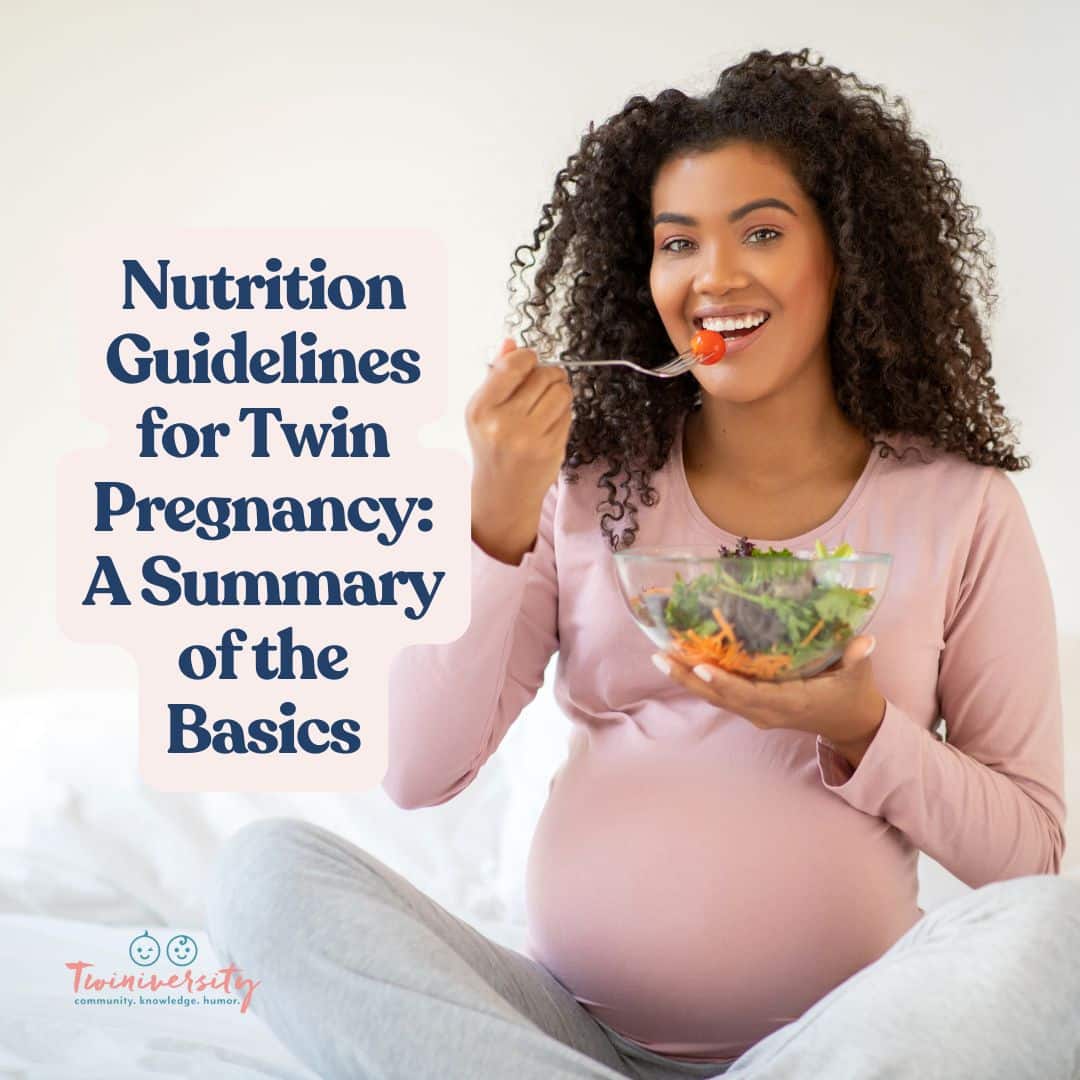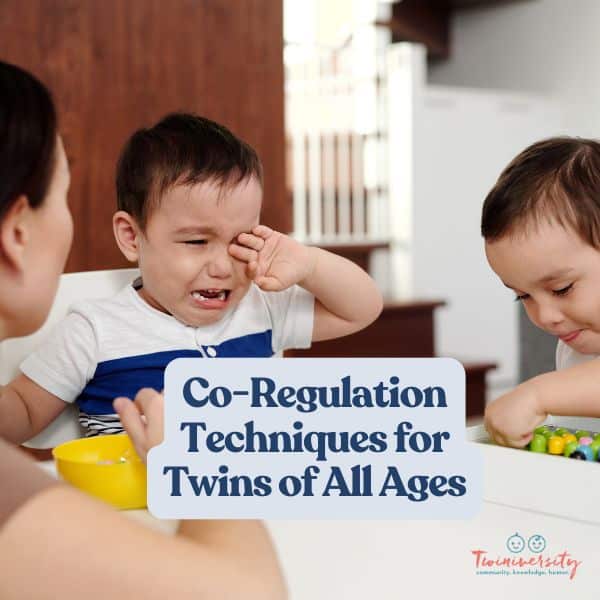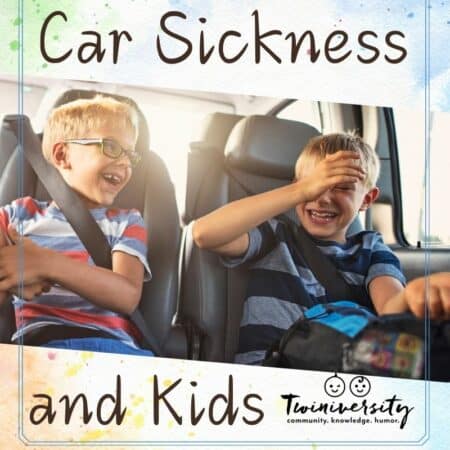
Who doesn’t love a good family road trip? Well, if you have a twinnie (or two) who gets car sick, road trips really aren’t that much fun for them or you! Keep reading to learn some tips and tricks to help manage car sickness and help make road trips fun again!
The car is packed, the snacks are within reach, and the kids are entertained (for now). Your playlist is teed up, and you’re ready to sing like you’re auditioning for American Idol. It’s family road trip time, and you’re off to see the world’s largest ball of twine because life is a highway, and you want to ride it all night long. There’s only one thing that could possibly put a damper on traveling in a confined space for hours on end to see a roadside attraction– car sick kiddos.

What is Car Sickness?
Have you ever felt sick while riding in a car? That queasy, dizzy feeling is called car sickness, and it’s a type of motion sickness. It happens when there’s a mismatch between what your eyes see and what your inner ear senses in terms of motion. This mix-up can confuse your brain and result in symptoms like nausea, dizziness, sweating, and even vomiting. According to The Centers for Disease Control and Prevention, car sickness is more common in children ages 2 to 12 years old.
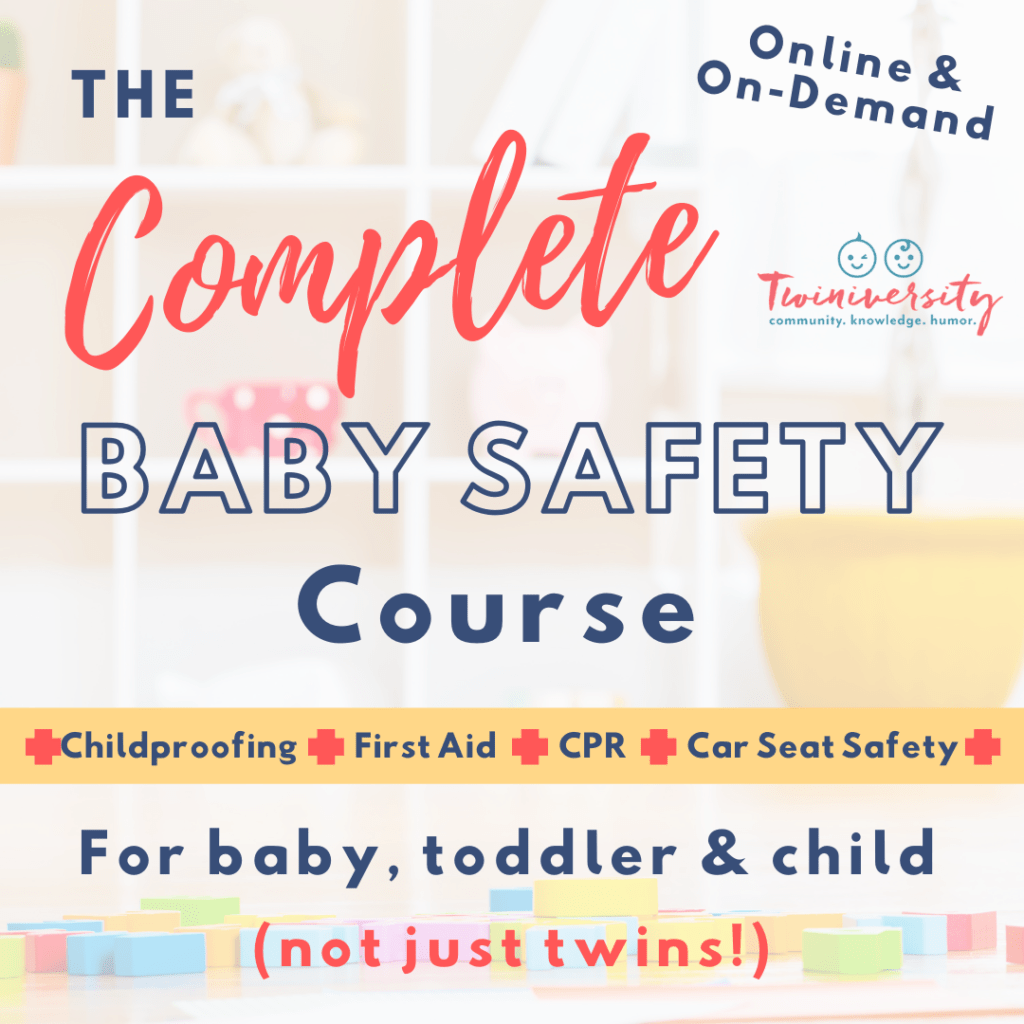
Need some baby safety training? Take the Twiniversity Complete Baby Safety course, offered on-demand. Includes video modules on infant, toddler, and child CPR, first aid, and common medical ailments, plus car seat installation and safety and childproofing your home. Click here to learn more!
Planning a family road trip? Check out 11 Must Have Supplies for Road Trips with Twins.
All content on this website, including medical opinions and any other health-related information, is for informational purposes only and should not be considered to be a specific diagnosis or treatment plan for any individual situation. Use of this site and the information contained herein does not create a doctor-patient relationship. Always seek the direct advice of your own doctor in connection with any questions or issues you may have regarding your own health or the health of others.
Car Sick Symptoms in Kids
It can be challenging to determine if children under 2 years old are experiencing motion sickness because they may not be able to communicate their symptoms clearly. If your child is too young to communicate their car sickness with you, they may instead excessively cry, become sweaty and pale, yawn frequently, get restless, or, in severe cases, vomit.
Car sickness can present with various symptoms in children over the age of 2, including nausea, vomiting, dizziness, paleness, sweating, fatigue, headaches, and irritability. After age 12, the main symptom is nausea.
The symptoms and severity can vary from child to child. If your child frequently experiences car sickness or if their symptoms are severe, it’s a good idea to consult with a healthcare professional for further evaluation and advice.
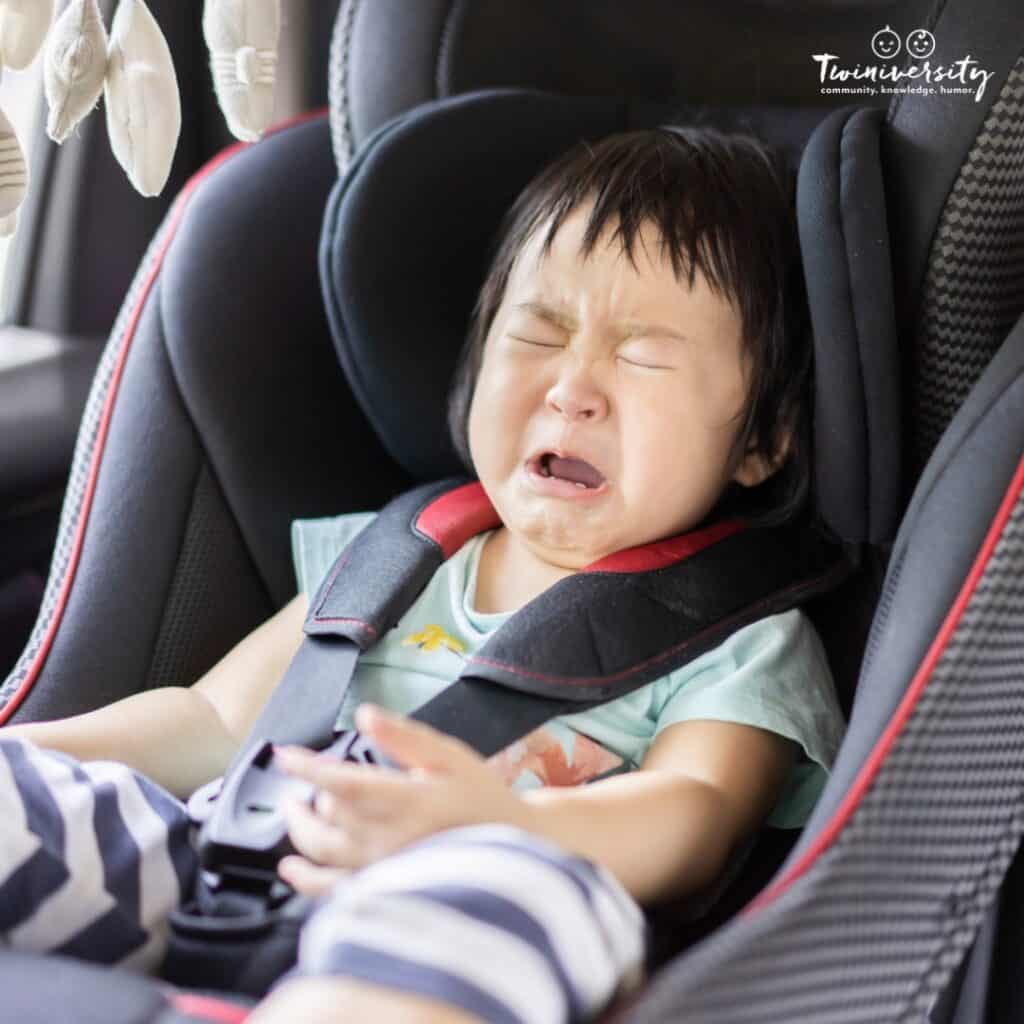
What causes kids to get car sick?
Kids get carsick because their inner ears sense motion differently from what their eyes see. This mix-up can confuse their brains. Leading to symptoms like feeling queasy or throwing up, kind of like how the body reacts to poisoning. Some kids are more likely to get carsick due to factors like their age, genetics, or just how they’re wired.
Does car sickness go away?
As kids grow up, they’re less likely to get carsick. That’s because their inner ears, which are key for balance and sensing motion, mature and get better at sending clear signals. Plus, as they get older, they might figure out tricks that help them deal with or avoid feeling sick in the car. But for some people, car sickness sticks around into adulthood.
Car sickness or stomach bug
It can be tricky to tell if a kid’s feeling sick from a bumpy car ride or if it’s a stomach bug, especially since some kids might not be able to explain how they’re feeling. Here are some ways to tell the difference:

Car Sickness:
- Happens during or right after car trips.
- Symptoms: feeling queasy, throwing up, dizzy, looking pale, sweating.
- Usually gets better once the car ride is over.
- No fever or signs of being sick otherwise.
Stomach Bug (Gastroenteritis):
- Can happen any time, not just in the car.
- Symptoms: feeling sick, throwing up, diarrhea, fever, stomach cramps.
- Might feel sick even after the car ride.
- Other family members or people close by might get sick, too.
If you think your child might have a stomach bug, keep an eye on how they’re feeling. If they get worse or show signs of dehydration, like a dry mouth, sunken eyes, or not peeing as much as usual, speak with your doctor.

Need some twin parent friends? Get the support you need with a Twiniversity Membership. Benefits include a monthly twin parent club meeting on Zoom, access to a private Facebook group just for twin parents, and a video library of twin parenting lessons. Visit Twiniversity.com/membership to join today!
Car sickness remedies
Dealing with car sickness can be tough, but there are a few things you can try.
- Sea-band bracelets (child-size). These acupressure wristbands are supposed to help relieve nausea caused by motion sickness by stimulating pressure points. I used these for morning sickness (which was around the clock for me) during my twin pregnancy and felt like they helped while driving on winding roads in Hawaii on an ill-timed honeymoon.
- Have your children look out the front window instead of the side windows.
- Roll down the windows slightly for some fresh air.
- Use Sunshades. Direct sunlight can worsen motion sickness for some people. Sunshades or tinting the windows can help reduce glare.
- Feed your children small amounts of bland snacks such as crackers with sips of water.
- Bring the right kind of entertainment. Books or videos may exacerbate nausea, while music or audio books are better options.
- Travel during sleep times. If your child is sleeping, they likely won’t experience car sickness.
- Consult your child’s pediatrician about anti-motion sickness medication, such as Dramamine. This type of medication can be bought over the counter for children aged 2 and older. It is recommended to be given an hour before traveling, which lasts about 6 hours.
Car sickness in kids is a common and often temporary issue. While it can be uncomfortable and inconvenient, especially for parents on the go, most children tend to outgrow it as they mature. If your child does get car sick, try stopping the vehicle and letting them lay down on their back to lessen the dizziness. Use a cool cloth on their forehead and offer a small snack and sips of water until the nausea subsides. The good news is that car sickness usually subsides within 4 hours of the motion stopping. So although the journey might not be the best, it won’t ruin the destination!

Maddison Ellison is a mom to vibrant and mischievous twin toddler girls. She works as a nurse in the Denver metro area and enjoys getting outside with her twins, husband, and sheepadoodle, Rosie. Maddison is inspired by health, wellness, the magic of everyday life, and of course, coffee.

